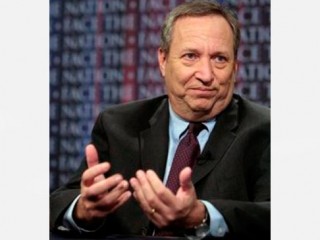
Larry Summers biography
Date of birth : 1954-11-30
Date of death : -
Birthplace : New Haven, Connecticut, United States
Nationality : American
Category : Politics
Last modified : 2010-06-23
Credited as : Politician and economist, Director of the National Economic Council, Obama administration
0 votes so far
Larry Summers was named director of the National Economic Council by then-U.S. President-elect Barack Obama on November 24, 2008, formally stepping into the post after the president's inauguration in January of the following year. His largely distinguished career had previously included such prestigious positions as chief economist of the World Bank and treasury secretary of the United States, but had hit a rough patch during his embattled tenure as president of Harvard University. Before his new White House appointment, he had most recently served as the Charles W. Eliot University Professor at Harvard.
Eminent and Controversial Career
Summers was born on November 30, 1954, in New Haven, Connecticut, the eldest of three sons. His economics professor parents were both teaching at Yale University at the time. (The family apparently had a gift for economics, as two of his uncles, Paul Samuelson and Kenneth Arrow, were awarded Nobel Prizes in the field.) Summers spent most of his childhood in Penn Valley, Pennsylvania, where he attended public schools until leaving for the Massachusetts Institute of Technology (MIT) after finishing his junior year of high school. At MIT he displayed his own knack for economics, receiving a degree in the subject in 1975. He went on to earn a doctorate in economics from Harvard University in 1982.
While working on his Ph.D., Summers taught at MIT, becoming an associate professor there by 1982. He then took a job in Washington, D.C., on the staff of the president's Council of Economic Advisors. In 1983 he returned to Harvard to become, at just 28, one of the youngest tenured professors in the school's history. Four years later, his reputation was further enhanced when he became the first social scientist to ever receive the National Science Foundation's Alan T. Waterman Award. Washington called again in 1991, when Summers signed on as chief economist of the World Bank. He remained there until becoming undersecretary of the U.S. Treasury in 1993, eventually rising to become secretary of the treasury in 1999.
Summers served as head of the U.S. Treasury until January of 2001, leaving with the department's highest award, the Alexander Hamilton Medal. He then worked briefly as a distinguished fellow at the Brookings Institution in Washington. What followed was almost certainly his most controversial position in an otherwise distinguished career--the presidency of Harvard. Summers assumed the office in July of 2001 and soon became embroiled in rifts with the faculty. Various internal confrontations ensued, but the nadir was undoubtedly the international outcry sparked by his public speculation in the summer of 2005 that women might have innate differences that kept them lagging behind men in careers in math and science. Matters eventually culminated in an imminent vote of no confidence by the school's biggest faculty, expected in February of 2006, and which Summers avoided by resigning, effective in June of that year. He took a sabbatical and returned to Harvard in 2007 to accept the prestigious role of Charles W. Eliot University Professor. He held that position until joining the administration of newly-elected U.S. President Barack Obama in January of 2009 as director of the National Economic Council and assistant to the president for economic policy. For Summers, yet another challenge lay ahead.
AWARDS
National Science Foundation, Alan T. Waterman Award, 1987; John Bates Clark Medal, 1993; U.S. Treasury Department, Alexander Hamilton Medal, 2001.
















